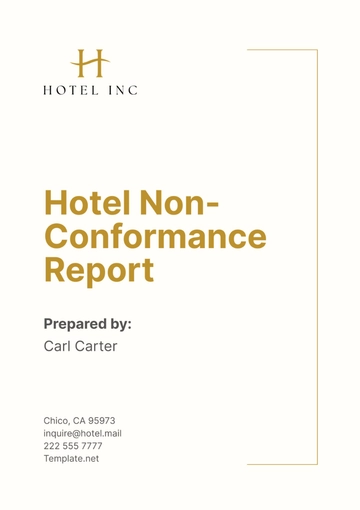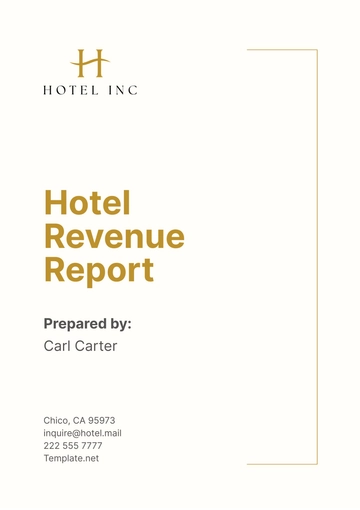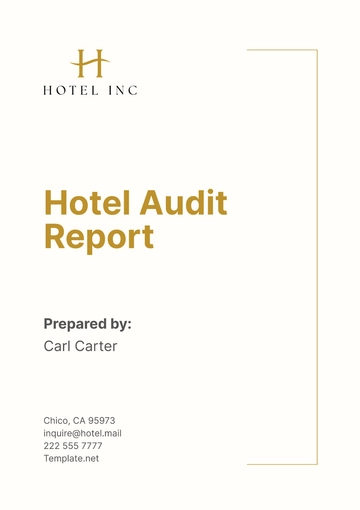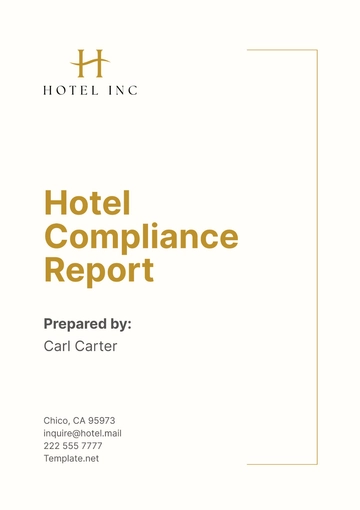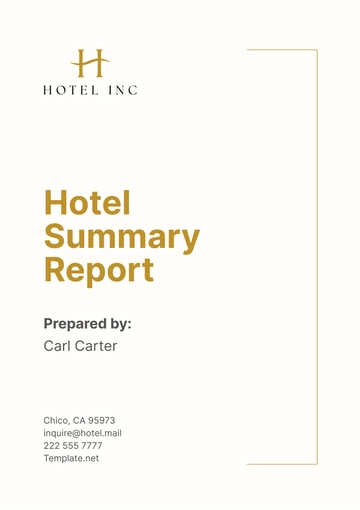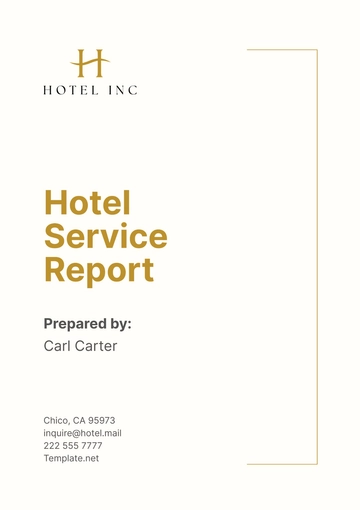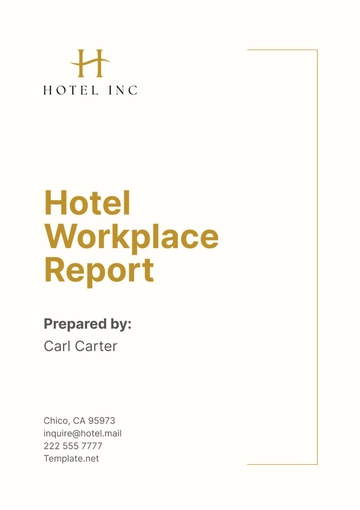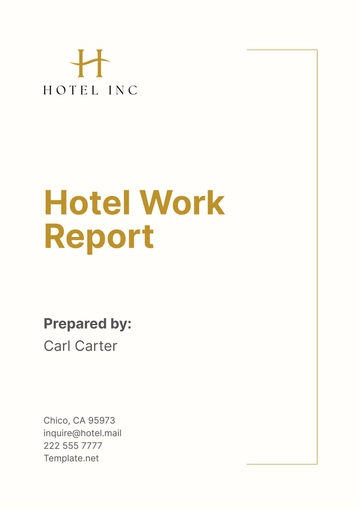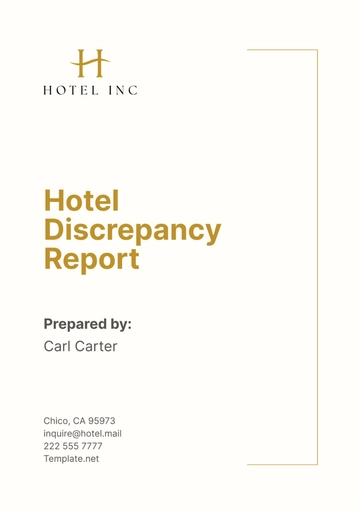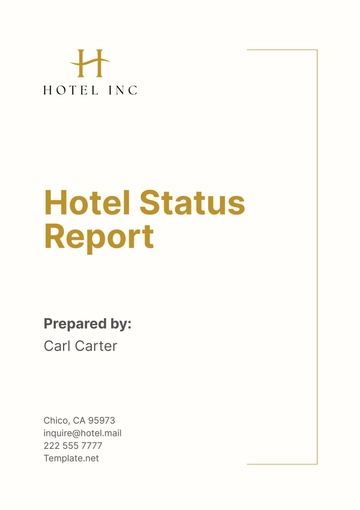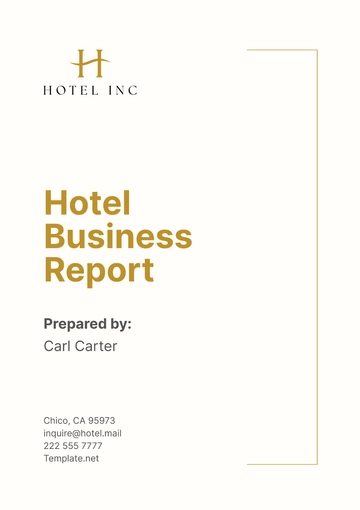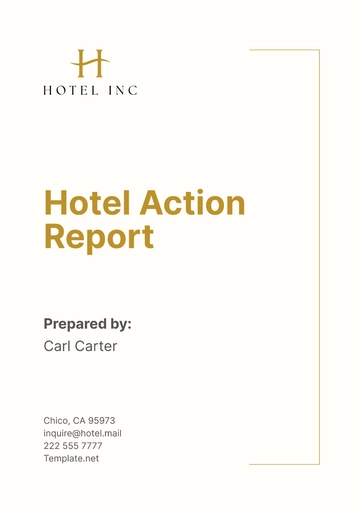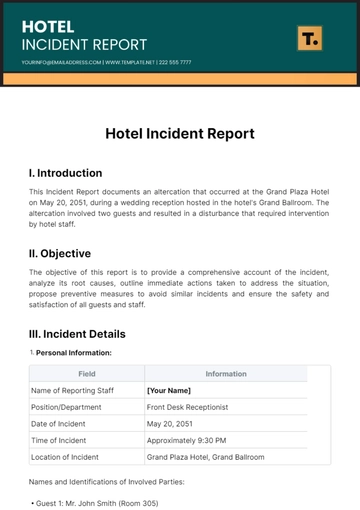Free Hotel Compliance Report
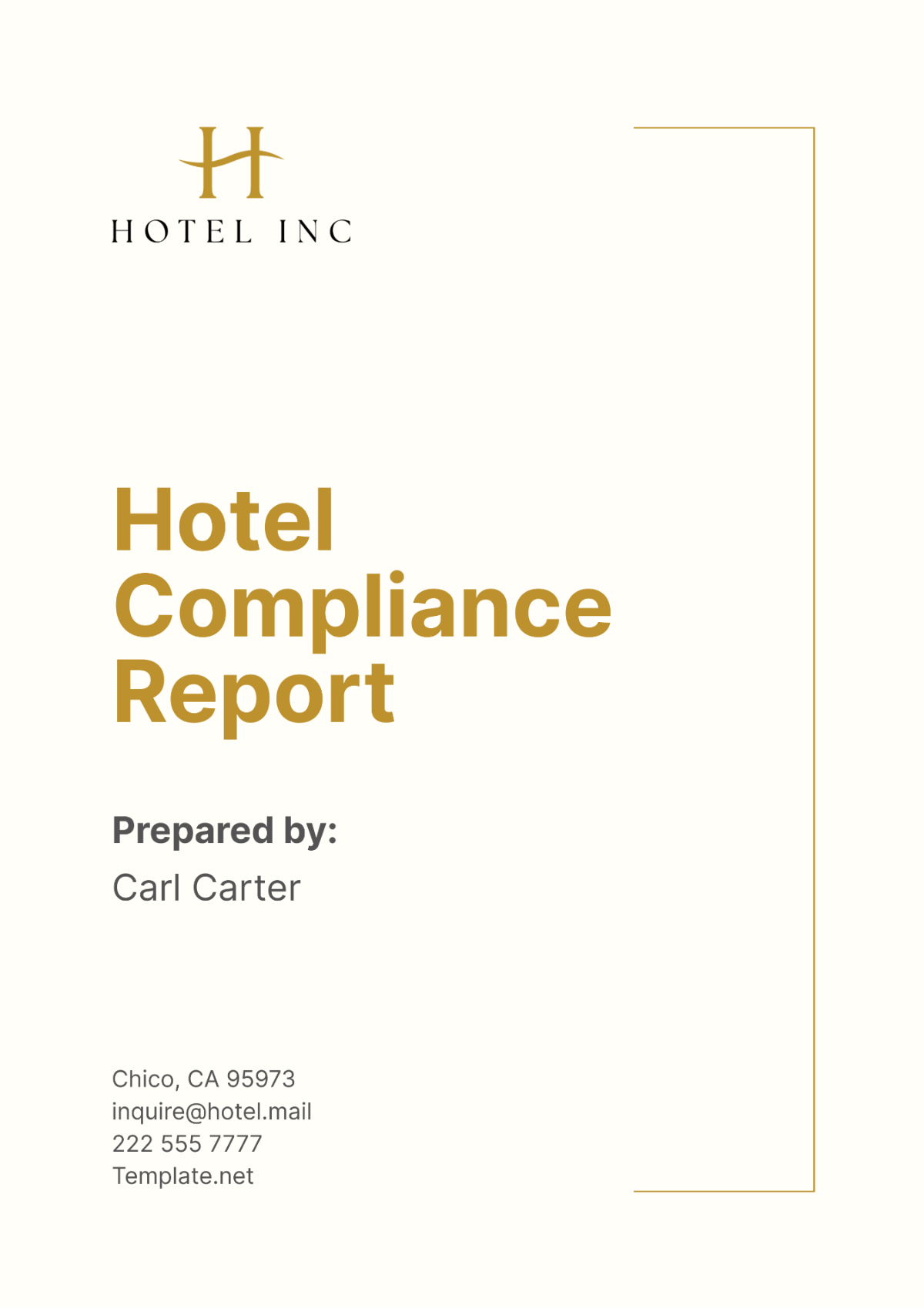
I. Introduction
The purpose of this Hotel Compliance Report is to ensure that [Your Company Name] operates within the framework of all applicable federal, state, and local laws and regulations. This report aims to provide a thorough assessment of the hotel's adherence to legal requirements, industry standards, and internal policies, thereby identifying areas of compliance as well as any deficiencies that need to be addressed. Maintaining compliance not only mitigates legal and financial risks but also enhances the reputation of our hotel, ensuring a safe and pleasant environment for both guests and employees.
Overview of Compliance Areas Covered
This report covers several critical compliance areas essential for the effective operation of [Your Company Name]. These areas include:
Regulatory Compliance: Adherence to local, state, and federal laws governing hotel operations.
Health and Safety Compliance: Implementation of health and safety policies, including fire safety, food safety, and employee health protocols.
Environmental Compliance: Practices related to waste management, energy conservation, and adherence to environmental regulations.
Labor and Employment Compliance: Compliance with labor laws, employee rights, working conditions, and diversity policies.
Financial Compliance: Accuracy of financial reporting, tax law adherence, internal controls, and anti-money laundering measures.
Guest Services Compliance: Standards for guest services, handling of complaints, accessibility compliance, and data privacy policies.
Methodology Used for the Compliance Assessment
The compliance assessment for this report was conducted using a combination of methods to ensure a comprehensive review. These methods included:
Document Review: Examination of internal policies, procedures, training records, and previous compliance reports.
Interviews: Conversations with key personnel, including management, staff, and external compliance experts, to gather insights and verify practices.
On-Site Inspections: Physical inspections of the hotel premises to observe safety measures, environmental practices, and operational procedures.
Data Analysis: Review of financial records, guest feedback, health inspection reports, and other relevant data to identify trends and potential compliance issues.
Benchmarking: Comparison of [Your Company Name]'s practices against industry standards and best practices to ensure alignment with current regulatory expectations.
II. Regulatory Compliance
Compliance with a complex array of local, state, and federal laws is essential for the lawful and smooth operation of [Your Company Name]. Key regulations include:
Local Laws: Zoning regulations, building codes, health department regulations, noise ordinances, and local business licenses.
State Laws: State-specific labor laws, environmental regulations, state health department standards, and hospitality industry-specific regulations.
Federal Laws: Americans with Disabilities Act (ADA), Occupational Safety and Health Administration (OSHA) regulations, Fair Labor Standards Act (FLSA), Environmental Protection Agency (EPA) standards, and Federal Trade Commission (FTC) regulations regarding consumer protection and advertising.
Status of Compliance with These Regulations
Local Laws
[Your Company Name] is in full compliance with local zoning regulations and building codes, ensuring all necessary permits and licenses are up-to-date. Regular inspections by the local health department have confirmed that the hotel meets all health and safety standards.
State Laws
The hotel adheres to state labor laws, including wage and hour regulations, and provides regular training to staff on these requirements. Environmental regulations are met through our comprehensive waste management and energy conservation programs. Our hotel also meets all state health department standards.
Federal Laws
[Your Company Name] is compliant with the ADA, providing accessible facilities and accommodations for guests with disabilities. OSHA regulations are strictly followed, with ongoing safety training and regular audits to ensure a safe working environment. Compliance with the FLSA is maintained by accurately recording work hours and ensuring fair wages. Our environmental practices align with EPA standards, and our marketing and consumer protection practices comply with FTC regulations.
Actions Taken to Address Any Non-Compliance Issues
During the compliance assessment, several areas were identified where improvements were necessary to ensure full compliance:
Accessibility Enhancements
Following an ADA audit, additional ramps and accessible signage were installed to enhance accessibility. Staff received further training on assisting guests with disabilities.
Safety Protocols
OSHA identified areas for improvement in our emergency evacuation plan. We have since updated our evacuation procedures and conducted additional fire drills to ensure all staff are familiar with the new protocols.
Environmental Practices
A review by the state environmental agency highlighted the need for improved waste segregation. We implemented a more rigorous recycling program and installed additional recycling bins throughout the property.
Labor Law Compliance
An internal audit revealed inconsistencies in overtime pay calculations. We have updated our payroll system to ensure accurate recording and compensation of overtime hours. Staff training on labor laws has been intensified to prevent future discrepancies.
III. Health and Safety Compliance
[Your Company Name] is committed to maintaining a safe and healthy environment for both guests and employees. Our comprehensive health and safety policies include:
Sanitation Protocols: Regular cleaning and disinfecting of all areas, especially high-touch surfaces.
Incident Reporting: A structured procedure for reporting and addressing any accidents or health incidents.
Personal Protective Equipment (PPE): Provision of necessary PPE to employees, especially in high-risk areas.
Fire Safety Measures and Evacuation Plans
Ensuring fire safety is a top priority at [Your Company Name]. Our measures include:
Fire Detection Systems: Installation of smoke detectors and fire alarms throughout the hotel.
Fire Suppression Systems: Availability of fire extinguishers and sprinkler systems in key areas.
Evacuation Plans: Clearly marked evacuation routes and exits. Evacuation maps are posted in every room and common area.
Drills and Training: Regular fire drills are conducted to ensure that staff and guests are familiar with evacuation procedures. Employees receive ongoing training on fire safety protocols.
Health Inspection Results and Food Safety Standards
[Your Company Name] adheres to stringent food safety standards to ensure the health of our guests:
Health Inspections: The hotel undergoes regular health inspections by local health authorities. Our recent inspection received a high rating, confirming our adherence to health standards.
Food Safety Protocols: Implementation of Hazard Analysis Critical Control Point (HACCP) systems in our kitchen to manage food safety risks.
Staff Hygiene: Mandatory handwashing and use of gloves when handling food. Regular health checks for kitchen staff.
Employee Safety Training and Certifications
To maintain a safe working environment, we ensure that all employees are adequately trained:
Safety Training: New hires undergo comprehensive safety training, including emergency procedures, proper use of PPE, and safe handling of equipment.
Certifications: Key staff members hold certifications in first aid, CPR, and food handling. Training sessions are regularly updated to comply with the latest safety standards and regulations.
Ongoing Education: Periodic refresher courses and safety drills are conducted to keep employees informed about the latest health and safety practices.
IV. Environmental Compliance
This section highlights [Your Company Name]'s commitment to environmental responsibility through effective waste management, energy conservation, water usage reduction, and compliance with environmental regulations. It details our waste recycling programs, energy-efficient practices, water conservation efforts, and adherence to environmental standards. By prioritizing sustainability, [Your Company Name] aims to minimize its environmental impact and contribute to a greener future.
Waste Management Practices
At [Your Company Name], effective waste management is a key component of our environmental compliance strategy. Our practices include:
Recycling Programs: We have established comprehensive recycling programs for paper, plastic, glass, and metal. Recycling bins are strategically placed throughout the property to encourage guest and employee participation.
Organic Waste Disposal: Kitchen waste is segregated, with organic waste being composted or sent to local farms for animal feed. We also partner with local organizations to recycle used cooking oil.
Hazardous Waste Handling: Hazardous materials, such as cleaning agents and batteries, are disposed of following strict protocols to prevent environmental contamination. Staff is trained in the safe handling and disposal of these materials.
Energy Conservation Measures
Energy conservation is a critical aspect of our commitment to sustainability. Our measures include:
Energy-Efficient Lighting: We have replaced traditional incandescent bulbs with energy-efficient LED lighting throughout the hotel, significantly reducing our energy consumption.
HVAC Systems: Our heating, ventilation, and air conditioning (HVAC) systems are regularly maintained to ensure optimal efficiency. We have also installed programmable thermostats to manage energy use more effectively.
Renewable Energy: We have invested in renewable energy sources, including solar panels, to reduce our reliance on non-renewable energy. These panels provide a portion of the hotel's electricity needs.
Energy Audits: Regular energy audits are conducted to identify areas where further energy savings can be achieved. Based on audit findings, we implement improvements and track our progress.
Water Usage and Conservation Efforts
Water conservation is another priority at [Your Company Name]. Our efforts include:
Low-Flow Fixtures: Installation of low-flow showerheads, faucets, and toilets to reduce water usage without compromising guest comfort.
Laundry Practices: Encouraging guests to reuse towels and linens to reduce the frequency of laundry cycles. Our laundry facilities are equipped with high-efficiency washers and dryers.
Landscape Irrigation: Using drought-resistant plants and efficient irrigation systems in our landscaping to minimize water usage. We also collect rainwater for irrigation purposes.
Leak Detection: Regular inspections of plumbing systems to identify and repair leaks promptly, preventing water wastage.
Compliance with Environmental Regulations and Sustainability Initiatives
[Your Company Name] is fully committed to adhering to all relevant environmental regulations and actively participating in sustainability initiatives:
Regulatory Compliance: We comply with federal, state, and local environmental laws, including EPA regulations. Regular audits ensure ongoing adherence to these standards.
Green Certifications: The hotel has achieved various green certifications, such as LEED (Leadership in Energy and Environmental Design) and Green Key, recognizing our commitment to environmental sustainability.
Sustainability Programs: Participation in global and local sustainability programs, such as Earth Hour and local clean-up drives, demonstrates our commitment to environmental stewardship. We also collaborate with suppliers who share our commitment to sustainability.
Guest Education: Informational materials are provided to guests, encouraging them to participate in our environmental initiatives, such as energy conservation and recycling programs.
Through these comprehensive practices and initiatives, [Your Hotel Name] not only complies with environmental regulations but also actively contributes to the global effort of sustainability, ensuring a greener future for the community and our planet.
V. Labor and Employment Compliance
This section details [Your Company Name]'s commitment to labor and employment compliance, highlighting adherence to labor laws, employee rights, working conditions, training and development programs, and diversity and inclusion policies. By prioritizing these aspects, [Your Company Name] ensures a fair and supportive workplace for all employees, in accordance with federal, state, and local regulations.
Adherence to Labor Laws and Regulations
[Your Company Name] is committed to upholding labor laws and regulations at the federal, state, and local levels. Key areas of compliance include:
Wage and Hour Laws: Ensuring employees are paid fairly and accurately, including adherence to minimum wage requirements and payment of overtime as mandated by law.
Employee Classification: Proper classification of employees as either exempt or non-exempt, in accordance with the Fair Labor Standards Act (FLSA).
Work Hours and Breaks: Compliance with regulations regarding work hours, rest breaks, and meal periods to promote employee well-being and productivity.
Child Labor Laws: Adherence to laws regulating the employment of minors to protect their rights and ensure their safety.
Employee Rights and Working Conditions
[Your Company Name] prioritizes the rights and well-being of its employees. Our commitment includes:
Safe Working Conditions: Providing a safe and healthy work environment, including regular inspections and maintenance of equipment and facilities.
Non-Discrimination: Ensuring a workplace free from discrimination based on race, gender, age, disability, or other protected characteristics, in accordance with Title VII of the Civil Rights Act and other relevant laws.
Harassment Prevention: Implementing policies and training programs to prevent harassment and promote a respectful work environment.
Employee Privacy: Respecting employee privacy rights, including the confidentiality of personal information.
Training and Development Programs
[Your Company Name] invests in the professional development of its employees through comprehensive training programs, including:
Onboarding: New employees undergo a thorough orientation process to familiarize them with the hotel's policies, procedures, and culture.
Skills Development: Ongoing training programs to enhance employees' job skills and knowledge, ensuring they are equipped to perform their duties effectively.
Leadership Development: Training opportunities for employees to develop leadership skills and advance within the organization.
Compliance Training: Regular training on labor laws, safety protocols, and other relevant topics to ensure compliance and promote a culture of accountability.
Diversity and Inclusion Policies
[Your Company Name] is committed to fostering a diverse and inclusive workplace, including:
Equal Opportunity Employment: Providing equal opportunities for all employees and applicants, regardless of race, gender, religion, or other characteristics protected by law.
Diversity Initiatives: Implementing programs to promote diversity and inclusion, such as diversity training and employee resource groups.
Fair Treatment: Ensuring fair treatment of all employees, regardless of background, and fostering a culture of respect and inclusion.
VI. Financial Compliance
Financial compliance is essential for maintaining trust, ensuring legal adherence, and safeguarding a company's financial integrity. This section covers the accuracy of financial reporting, adherence to tax laws and financial regulations, internal controls and audit results, and anti-money laundering policies. Implementing rigorous financial compliance measures helps prevent errors, fraud, and legal penalties, thereby supporting the company's overall stability and reputation.
Accuracy of Financial Reporting
Ensuring the accuracy of financial reporting is fundamental to maintaining the trust of stakeholders and adhering to regulatory requirements. Financial statements must be prepared in accordance with Generally Accepted Accounting Principles (GAAP) or International Financial Reporting Standards (IFRS), depending on the jurisdiction. This includes ensuring that all financial data is accurate, complete, and verifiable. Regular audits, both internal and external, are essential to validate the accuracy of these reports. These audits help to identify discrepancies and errors, ensuring that financial statements accurately reflect the company's financial position. Implementing robust accounting software and maintaining detailed records of all financial transactions further support accuracy in financial reporting.
Adherence to Tax Laws and Financial Regulations
Compliance with tax laws and financial regulations is crucial to avoid legal penalties and maintain the company's reputation. This includes timely filing of tax returns, accurate calculation of tax liabilities, and adherence to all relevant tax codes. Companies must stay updated with changes in tax legislation and financial regulations to ensure ongoing compliance. Employing a knowledgeable tax professional or consulting with a tax advisory firm can help in navigating complex tax laws. Additionally, regular training for staff involved in financial operations can ensure that they are aware of and understand current tax and financial regulations, thereby minimizing the risk of non-compliance.
Internal Controls and Audit Results
Internal controls are processes and procedures put in place to ensure the integrity of financial and accounting information, promote accountability, and prevent fraud. These controls include segregation of duties, access controls, physical audits, standardized documentation, and approval authority requirements. Effective internal controls help in detecting and preventing errors and irregularities in financial reporting. Regular internal audits are conducted to evaluate the effectiveness of these controls and identify areas for improvement. The results of these audits should be documented and reviewed by senior management to ensure that appropriate corrective actions are taken. External audits also play a critical role in validating the company's internal controls and providing an independent assessment of financial compliance.
Anti-Money Laundering Policies
Anti-money laundering (AML) policies are designed to prevent the practice of generating income through illegal actions and integrating it into the legitimate financial system. These policies include customer due diligence, transaction monitoring, and reporting suspicious activities to relevant authorities. Customer due diligence involves verifying the identity of clients and assessing their risk profile. Transaction monitoring systems are used to detect unusual patterns of transactions that may indicate money laundering activities. Companies are also required to report any suspicious transactions to regulatory bodies. Training employees on AML regulations and the importance of vigilance in identifying and reporting suspicious activities is essential. Furthermore, regular reviews and updates of AML policies ensure they remain effective in combating money laundering and are in line with current regulations.
VII. Guest Services Compliance
Ensuring compliance in guest services is vital for providing outstanding experiences and maintaining the hotel's reputation. This section covers standards for guest services and satisfaction, handling of guest complaints and feedback, accessibility compliance, and data protection and privacy policies for guests. By adhering to these standards, the hotel can foster a welcoming environment, ensure inclusivity, and protect guest information, thereby enhancing overall guest satisfaction and trust.
Standards for Guest Services and Satisfaction
Staff Training and Behavior
Providing exceptional guest services begins with staff training. Employees should undergo comprehensive training programs that cover customer service skills, hotel standards, and the importance of professionalism. This training ensures that all staff members can consistently deliver courteous and effective service.
Measuring Guest Satisfaction
Regularly measuring guest satisfaction through surveys, feedback forms, and online reviews helps gauge the hotel's performance. These insights enable the hotel to identify strengths and areas for improvement, ensuring that guest services continually meet and exceed expectations.
Handling of Guest Complaints and Feedback
Complaint Management Process
A well-defined process for handling complaints is crucial. This process should include prompt acknowledgment, detailed investigation, and swift resolution. Frontline staff should be empowered to resolve common issues, while more complex problems may require management intervention.
Utilizing Guest Feedback
Actively seeking and utilizing guest feedback through surveys, suggestion boxes, and follow-up communications shows guests that their opinions are valued. This feedback should be analyzed to identify recurring issues and inform service improvements, enhancing overall guest satisfaction.
Accessibility Compliance (e.g., ADA Requirements)
Facility Accessibility
Compliance with the Americans with Disabilities Act (ADA) and other accessibility standards is essential. This includes providing accessible rooms equipped with features such as roll-in showers, grab bars, and appropriate signage. Common areas like entrances, restrooms, and dining facilities must also be accessible.
Staff Training on Accessibility
Staff should be trained to understand accessibility needs and how to assist guests with disabilities effectively. This training ensures that all guests receive respectful and appropriate service, fostering an inclusive environment.
Data Protection and Privacy Policies for Guests
Secure Data Handling
Protecting guest data involves secure storage and handling of personal information, including names, contact details, and payment information. Adherence to regulations such as the General Data Protection Regulation (GDPR) and other privacy laws is crucial.
Cybersecurity Measures
Implementing advanced cybersecurity measures, such as data encryption, secure payment processing, and regular system audits, helps protect against data breaches. Staff training on data protection practices further ensures the confidentiality and security of guest information.
VIII. Action Plan and Recommendations
Addressing identified compliance gaps is crucial for enhancing the overall guest experience and ensuring legal adherence. The action plan includes a summary of findings, recommended corrective actions, and improvements, along with a clear timeline for implementation. By following this structured approach, the hotel can systematically improve its operations, enhance guest satisfaction, and maintain robust compliance with industry standards. Monitoring and follow-up procedures are also outlined to ensure the sustainability of these improvements.
Summary of Findings
Inconsistent adherence to guest service standards.
Inefficient handling of guest complaints.
Incomplete accessibility compliance in some areas.
Insufficient data protection and privacy measures.
Recommended Corrective Actions and Improvements
Standardize Guest Service Training
Develop and implement a comprehensive training program for all staff members to ensure consistent adherence to guest service standards.
Enhance Complaint Management Process
Establish a clear and efficient process for handling guest complaints, including training staff on immediate resolution techniques and escalation procedures.
Improve Accessibility Compliance
Conduct an accessibility audit to identify non-compliant areas and make necessary modifications to meet ADA and other relevant standards.
Provide regular training for staff on accessibility awareness and assistance.
Strengthen Data Protection Measures
Implement advanced cybersecurity measures such as data encryption and secure payment processing.
Regularly update data protection policies and conduct staff training on maintaining confidentiality and compliance with privacy laws.
Timeline for Implementation of Recommendations
Action | Start Date | End Date | Responsible Party |
|---|---|---|---|
Standardize Guest Service Training | [Month Day, Year] | [Month Day, Year] | HR and Training Dept. |
Enhance Complaint Management Process | [Month Day, Year] | [Month Day, Year] | |
Operations Manager | [Month Day, Year] | [Month Day, Year] | Facilities Manager |
Strengthen Data Protection Measures | [Month Day, Year] | [Month Day, Year] | IT Department |
Monitoring and Follow-Up Procedures
Regular Audits and Reviews
Conduct quarterly audits to ensure compliance with guest service standards, accessibility requirements, and data protection policies.
Review guest feedback and complaint logs regularly to identify trends and areas needing further improvement.
Training Refreshers
Schedule bi-annual training refreshers for staff to keep them updated on best practices in guest services, complaint handling, accessibility assistance, and data protection.
Performance Metrics
Establish key performance indicators (KPIs) to measure the effectiveness of implemented changes, such as guest satisfaction scores, the number of resolved complaints, and data breach incidents.
Reporting and Accountability
Designate a compliance officer or team to oversee the implementation and ongoing adherence to the recommended corrective actions.
Require regular reporting to senior management on the progress and outcomes of compliance efforts.
This Hotel Compliance Report outlines essential strategies to ensure adherence to industry standards and enhance guest experiences. By addressing identified compliance gaps and implementing recommended corrective actions, the hotel can significantly improve its operations and reputation. Ongoing monitoring and follow-up will ensure the sustainability of these improvements, fostering a culture of continuous enhancement. Ultimately, these efforts will lead to increased guest satisfaction, legal compliance, and a stronger competitive position in the hospitality market.
- 100% Customizable, free editor
- Access 1 Million+ Templates, photo’s & graphics
- Download or share as a template
- Click and replace photos, graphics, text, backgrounds
- Resize, crop, AI write & more
- Access advanced editor
Introducing Template.net's Hotel Compliance Report Template, a comprehensive solution for your hospitality business. This editable and customizable template is designed to streamline your compliance reporting, ensuring adherence to regulations and standards. Editable in our Ai Editor Tool, it ensures a seamless experience in creating and managing your compliance reports.
You may also like
- Sales Report
- Daily Report
- Project Report
- Business Report
- Weekly Report
- Incident Report
- Annual Report
- Report Layout
- Report Design
- Progress Report
- Marketing Report
- Company Report
- Monthly Report
- Audit Report
- Status Report
- School Report
- Reports Hr
- Management Report
- Project Status Report
- Handover Report
- Health And Safety Report
- Restaurant Report
- Construction Report
- Research Report
- Evaluation Report
- Investigation Report
- Employee Report
- Advertising Report
- Weekly Status Report
- Project Management Report
- Finance Report
- Service Report
- Technical Report
- Meeting Report
- Quarterly Report
- Inspection Report
- Medical Report
- Test Report
- Summary Report
- Inventory Report
- Valuation Report
- Operations Report
- Payroll Report
- Training Report
- Job Report
- Case Report
- Performance Report
- Board Report
- Internal Audit Report
- Student Report
- Monthly Management Report
- Small Business Report
- Accident Report
- Call Center Report
- Activity Report
- IT and Software Report
- Internship Report
- Visit Report
- Product Report
- Book Report
- Property Report
- Recruitment Report
- University Report
- Event Report
- SEO Report
- Conference Report
- Narrative Report
- Nursing Home Report
- Preschool Report
- Call Report
- Customer Report
- Employee Incident Report
- Accomplishment Report
- Social Media Report
- Work From Home Report
- Security Report
- Damage Report
- Quality Report
- Internal Report
- Nurse Report
- Real Estate Report
- Hotel Report
- Equipment Report
- Credit Report
- Field Report
- Non Profit Report
- Maintenance Report
- News Report
- Survey Report
- Executive Report
- Law Firm Report
- Advertising Agency Report
- Interior Design Report
- Travel Agency Report
- Stock Report
- Salon Report
- Bug Report
- Workplace Report
- Action Report
- Investor Report
- Cleaning Services Report
- Consulting Report
- Freelancer Report
- Site Visit Report
- Trip Report
- Classroom Observation Report
- Vehicle Report
- Final Report
- Software Report

